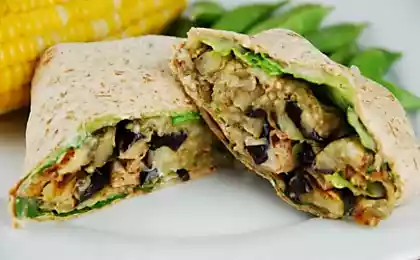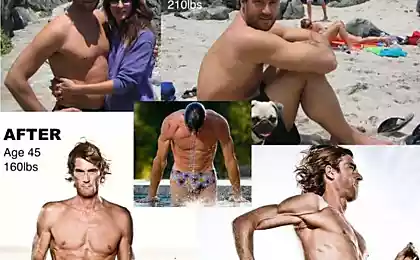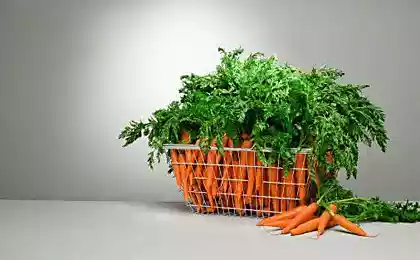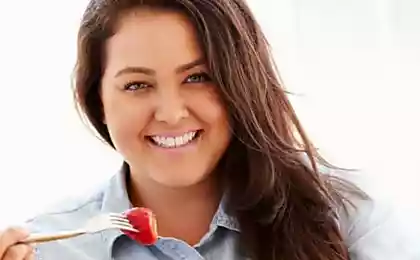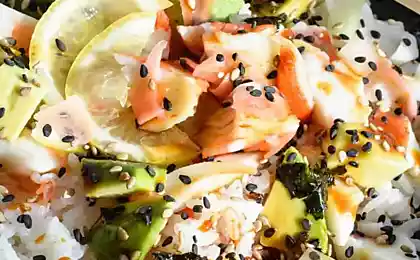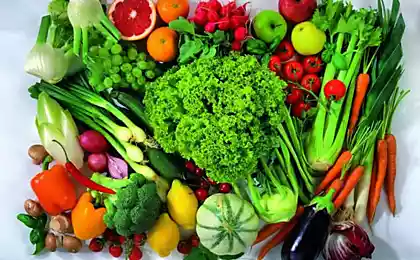546
Rich Roll: Killing the myth of protein
Fifty three million five hundred forty five thousand eighty eight
A graduate of Stanford University and Cornell law faculty, rich Roll is a writer, world-famous athlete, consultant, husband and father, as well as a source of inspiration for all people in the world. He is the first of two people on the planet, which is five times finished the championship Ironman triathlon on five Hawaiian Islands. Recently, rich Roll wrote an article that debunks the myths about protein and share my experience.
I eat plant food. Essentially, this means that I don't eat anything with a face or a mother. Animals find this quite acceptable. I'm also an ultra-endurance athlete. Essentially, this means that I do not run fast, but I can go on all day. My wife finds this quite acceptable. There is a widespread view that the words "vegan" and "athlete" are simply incompatible. Let's call it irreconcilable differences. I'm here to tell you that this is nonsense.
"But where do you get your protein?"
Is not for this issue. If I had a dollar for every time this question every member of my family would be driving a Maybach.
Most vegans bristle at this question. Being in constant combat readiness, they immediately assume a defensive position, ready powerful throw to fight in the eternal struggle of carnivores and herbivores. Since all systems of power have always been tightly connected with religion and politics-emotions strained to the limit. You do not have time to blink – arrows are flying in all directions, and the debate turned into a generous pouring mud at each other. Endless, hopelessly unproductive vicious cycle that leaves each side further entrenched in their preferred dogma and never leads anywhere constructive.
I hate that. This is the reason why a large part of society finds vegans so unpalatable. Instead, I welcome the question. I have a genuine interest – I see an opportunity for a productive discussion. So let's try to have that discussion right now. I mean productive discussion. I will describe you my vision on the elephant in the room ... nothing more, nothing less.
We live in a society in which we have been willfully misled to believe that meat and dairy products are the only truly valuable source of protein. Without copious amounts of animal protein, it's impossible to be healthy, not to mention to become a successful athlete. This message is everywhere. From relatively recent (and incredibly loud, I must admit) advertising companies the dairy industry, stories about pushing chocolate milk as the universal means of recovery after exercise (devilishly brilliant!), to flashy labels and the overwhelming amount of expert opinions on sports in favor of animal protein. Protein, protein, protein – a spell that is enhanced by the adage that "bigger is better".
Regardless of whether you are a professional athlete or a sofa vegetable, tempered this notion is so deeply rooted in our collective belief system that any attempt to challenge it is immediately perceived as an unspeakable heresy.
Directly through my personal experience, I came to the conclusion that it is a common concept in the best cases, is a misconception, not to say obscene lies. A lie, designed by the well-funded misinformation machine created by well-funded, powerful industry, Big Food and meat, dairy and egg industry, which spent space the amount of marketing dollars to convince society as a simple idea: our lives depend on animal protein, almost as much as air and water.
Promotion of animal protein is not only based on lies, it just kills us, enticing to eat fruit factory farms, stuffed with hormones, low in fiber and high in saturated fat. I am absolutely convinced that this power (despite the popularity of diets with a high content of animal fat and low in carbohydrates) is causing today's epidemic of cardiovascular diseases (#1 killer in the world) and many other diseases of modern mankind.
Indeed, protein is an essential nutrient, absolutely critical not just in building and repairing muscle tissue, but also in maintaining a wide range of important functions in our body. But is there any difference, whether you get protein from plants or from animal products? And how much protein you actually need?
Proteins consist of twenty different amino acids, eleven of which can be synthesized by our body naturally. The remaining nine – what we call essential amino acids-must be ingested from food. Technically, our bodies require certain amino acids, not protein per se. But, somehow, these nine essential amino acids are hardly the exclusive domain of animal products. Actually, they are originally synthesized by plants and are found in meat and dairy products only because animals eat these plants.
Despite a new wave of hysteria with a recent cover of Times magazine, where adorned the inscription "butter is back!" the best medical agents established beyond a criticism of the framework within which the casein and Syrovatko substance defined as elements with a significant contribution to the development of degenerative diseases. A family of proteins found in milk, is associated with the onset of a variety of diseases, including cancer.
On a personal anecdotal level, eight years ago, adopting a way of life with nutrition, plant-based, restoring our overall health and fully updated, I was able to construct its relationship with the sport in new ways. Despite the fact that as a society find that hard to believe, my athletic performance has increased. Not only because of the change in diet, rather it is a direct result of full acceptance of this new way of eating and lifestyle.
And I'm not alone in this list.
Just ask fighter David Carter of Oakland raiders.
Just watch this video of strongman Patrik Babolian has the world record for most weight lifted by man dragged 10 meters on the stage 1200 pounds – the approximate weight of the car.
Marvel at this video, where vegan Frank Medrano doing with your body such things you even could not think.
Also MMA fighters/UFC – Mac Danzig, Jake shields
The bottom line: each of these athletes, like many others, will tell you the same thing. Instead of steak, milk, egg and whey, you can choose any option and decorate your chain, Jr., who will become sources of needed protein. For example, wild rice, beans, almonds, lentils, hemp seeds, and spirulina Canoa and less rich in plant protein foods – potatoes, sweet yams and bananas will lead you to the highest point to which you aspire.
Even if you ate nothing but a variety of fresh fruits, you still will not suffer a deficiency of protein (or even any particular amino acid). Already for many years I am quite seriously serious strain on your body, doing athletics endurance of 25 hours per week. At the same time, I believe that food plant-based has significantly enhanced and accelerated my ability to physical recovery between workouts – and it's the Holy Grail of achieving high sports results. Today I can say that at the age of 47 I'm healthier than I've ever been – even healthier than when I was a world class swimmer at Stanford in the late 80s.
And despite all that you heard earlier, I would argue that more protein does not mean better. Satisfy the needs of your body in the protein and leave it at that. As for professional athletes, to my knowledge, no research has shown that consumption of protein beyond the RDA recommended minimum (10% of daily calories) stimulates additional muscle growth or speed up recovery after exercise. And despite this, most people, the vast majority of whom lead a sedentary lifestyle, typically consume a daily protein times three times more than the required number, required for the development and preservation of optimal health. published
Source: mashamizzi.wix.com/green-mango#!Rich-Roll-Ubistvo-mifa-o-belke-/cmbz/DCDB9C4A-0761-4840-B8CD-41F0E7B54A4E
A graduate of Stanford University and Cornell law faculty, rich Roll is a writer, world-famous athlete, consultant, husband and father, as well as a source of inspiration for all people in the world. He is the first of two people on the planet, which is five times finished the championship Ironman triathlon on five Hawaiian Islands. Recently, rich Roll wrote an article that debunks the myths about protein and share my experience.
I eat plant food. Essentially, this means that I don't eat anything with a face or a mother. Animals find this quite acceptable. I'm also an ultra-endurance athlete. Essentially, this means that I do not run fast, but I can go on all day. My wife finds this quite acceptable. There is a widespread view that the words "vegan" and "athlete" are simply incompatible. Let's call it irreconcilable differences. I'm here to tell you that this is nonsense.
"But where do you get your protein?"
Is not for this issue. If I had a dollar for every time this question every member of my family would be driving a Maybach.
Most vegans bristle at this question. Being in constant combat readiness, they immediately assume a defensive position, ready powerful throw to fight in the eternal struggle of carnivores and herbivores. Since all systems of power have always been tightly connected with religion and politics-emotions strained to the limit. You do not have time to blink – arrows are flying in all directions, and the debate turned into a generous pouring mud at each other. Endless, hopelessly unproductive vicious cycle that leaves each side further entrenched in their preferred dogma and never leads anywhere constructive.
I hate that. This is the reason why a large part of society finds vegans so unpalatable. Instead, I welcome the question. I have a genuine interest – I see an opportunity for a productive discussion. So let's try to have that discussion right now. I mean productive discussion. I will describe you my vision on the elephant in the room ... nothing more, nothing less.
We live in a society in which we have been willfully misled to believe that meat and dairy products are the only truly valuable source of protein. Without copious amounts of animal protein, it's impossible to be healthy, not to mention to become a successful athlete. This message is everywhere. From relatively recent (and incredibly loud, I must admit) advertising companies the dairy industry, stories about pushing chocolate milk as the universal means of recovery after exercise (devilishly brilliant!), to flashy labels and the overwhelming amount of expert opinions on sports in favor of animal protein. Protein, protein, protein – a spell that is enhanced by the adage that "bigger is better".
Regardless of whether you are a professional athlete or a sofa vegetable, tempered this notion is so deeply rooted in our collective belief system that any attempt to challenge it is immediately perceived as an unspeakable heresy.
Directly through my personal experience, I came to the conclusion that it is a common concept in the best cases, is a misconception, not to say obscene lies. A lie, designed by the well-funded misinformation machine created by well-funded, powerful industry, Big Food and meat, dairy and egg industry, which spent space the amount of marketing dollars to convince society as a simple idea: our lives depend on animal protein, almost as much as air and water.
Promotion of animal protein is not only based on lies, it just kills us, enticing to eat fruit factory farms, stuffed with hormones, low in fiber and high in saturated fat. I am absolutely convinced that this power (despite the popularity of diets with a high content of animal fat and low in carbohydrates) is causing today's epidemic of cardiovascular diseases (#1 killer in the world) and many other diseases of modern mankind.
Indeed, protein is an essential nutrient, absolutely critical not just in building and repairing muscle tissue, but also in maintaining a wide range of important functions in our body. But is there any difference, whether you get protein from plants or from animal products? And how much protein you actually need?
Proteins consist of twenty different amino acids, eleven of which can be synthesized by our body naturally. The remaining nine – what we call essential amino acids-must be ingested from food. Technically, our bodies require certain amino acids, not protein per se. But, somehow, these nine essential amino acids are hardly the exclusive domain of animal products. Actually, they are originally synthesized by plants and are found in meat and dairy products only because animals eat these plants.
Despite a new wave of hysteria with a recent cover of Times magazine, where adorned the inscription "butter is back!" the best medical agents established beyond a criticism of the framework within which the casein and Syrovatko substance defined as elements with a significant contribution to the development of degenerative diseases. A family of proteins found in milk, is associated with the onset of a variety of diseases, including cancer.
On a personal anecdotal level, eight years ago, adopting a way of life with nutrition, plant-based, restoring our overall health and fully updated, I was able to construct its relationship with the sport in new ways. Despite the fact that as a society find that hard to believe, my athletic performance has increased. Not only because of the change in diet, rather it is a direct result of full acceptance of this new way of eating and lifestyle.
And I'm not alone in this list.
Just ask fighter David Carter of Oakland raiders.
Just watch this video of strongman Patrik Babolian has the world record for most weight lifted by man dragged 10 meters on the stage 1200 pounds – the approximate weight of the car.
Marvel at this video, where vegan Frank Medrano doing with your body such things you even could not think.
Also MMA fighters/UFC – Mac Danzig, Jake shields
The bottom line: each of these athletes, like many others, will tell you the same thing. Instead of steak, milk, egg and whey, you can choose any option and decorate your chain, Jr., who will become sources of needed protein. For example, wild rice, beans, almonds, lentils, hemp seeds, and spirulina Canoa and less rich in plant protein foods – potatoes, sweet yams and bananas will lead you to the highest point to which you aspire.
Even if you ate nothing but a variety of fresh fruits, you still will not suffer a deficiency of protein (or even any particular amino acid). Already for many years I am quite seriously serious strain on your body, doing athletics endurance of 25 hours per week. At the same time, I believe that food plant-based has significantly enhanced and accelerated my ability to physical recovery between workouts – and it's the Holy Grail of achieving high sports results. Today I can say that at the age of 47 I'm healthier than I've ever been – even healthier than when I was a world class swimmer at Stanford in the late 80s.
And despite all that you heard earlier, I would argue that more protein does not mean better. Satisfy the needs of your body in the protein and leave it at that. As for professional athletes, to my knowledge, no research has shown that consumption of protein beyond the RDA recommended minimum (10% of daily calories) stimulates additional muscle growth or speed up recovery after exercise. And despite this, most people, the vast majority of whom lead a sedentary lifestyle, typically consume a daily protein times three times more than the required number, required for the development and preservation of optimal health. published
Source: mashamizzi.wix.com/green-mango#!Rich-Roll-Ubistvo-mifa-o-belke-/cmbz/DCDB9C4A-0761-4840-B8CD-41F0E7B54A4E



